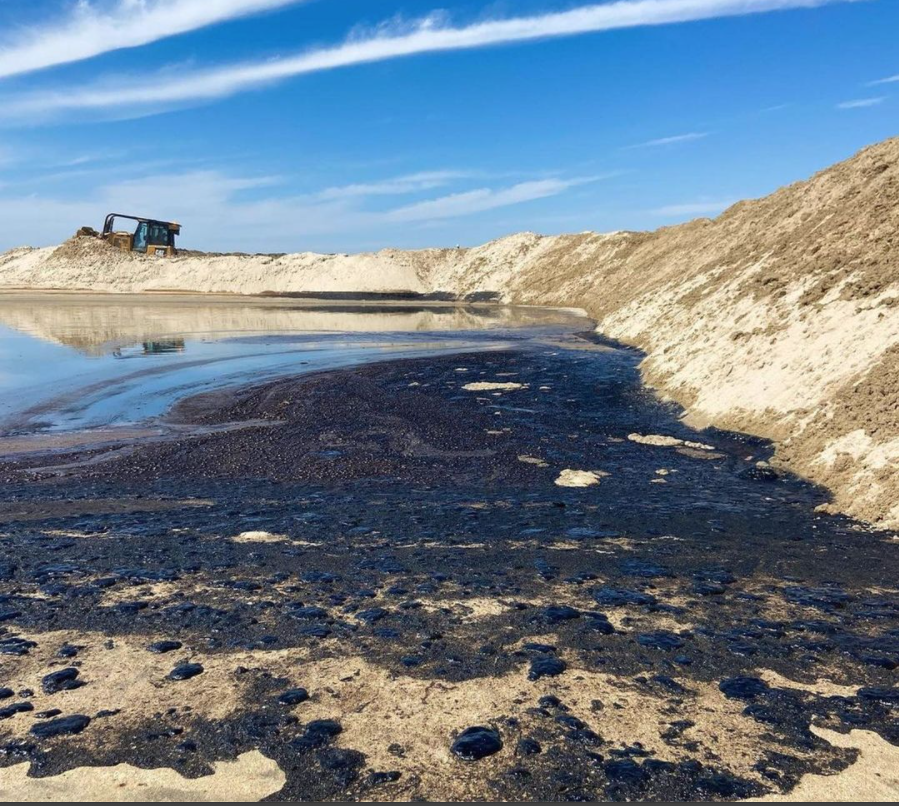Southern California was hit with the largest oil spill in California since 2015 on Saturday, Oct. 2, as over 126,000 gallons of oil leaked into the ocean.
The pipe, owned by Amplify Energy, “an independent and natural gas company,” is located off the Orange County coast, around five miles from the shores of Huntington Beach.
It has been over a week since the major incident occurred and many Southern California beaches remain closed as officials and volunteers work to clean up the mess left behind.California Governor Gavin Newsom issued a state of emergency in Orange County on Oct. 4 in which he ordered all hands on deck to assist in cleanup and prevention of any further damage.
In a quote from his website, Newsom says, “The state is moving to cut red tape and mobilize all available resources to protect public health and the environment. As California continues to lead the nation in phasing out fossil fuels and combating the climate crisis, this incident serves as a reminder of the enormous cost fossil fuels have on our communities and the environment.”
Many California residents share this concern on the lasting impact this spill is likely to have.
Peter H. Gleick, hydroclimatologist and member of the U.S. National Academy of Sciences, wrote an opinion piece for The Washington Post on Oct. 4 which emphasizes the detrimental effects oil spills like this are having on bird populations and the planet as a whole.
Last week’s oil spill took place in the middle of fall migration in which millions of birds head South along the coast for the winter.
“The Southern California spill is the worst sort of disruption. It tarred beaches and fouled a rare, fragile coastal wetland. And it happened at the peak of fall migration, in a spot especially important to the Pacific Flyway,” wrote Gleick, “Southern California’s beaches and remnant marshes offer sanctuary for thousands of migrating birds, including threatened and endangered species. Oil from the spill penetrated these marshes before adequate protective barriers could be put in place, raising the prospect of long-term damage. Birds are already dying.”
Along the Coast of Southern California, October is widely known to be the best time for surfing. Not only has this spill posed a major threat to the environment, but also to the coastal businesses that rely on the tourism these popular beaches bring in.
Orange County State Senator, Dave Min, posted a video to his Twitter account on Oct. 5 which showed all the empty beaches that have been closed as a result of the oil spill. “I have never seen, nor do I ever again want to see, the beaches of Huntington Beach, Newport Beach, and Laguna beach this empty,” wrote Min, “I am 100% committed to doing what I can to ensure California’s coastlines never experience another oil spill.”
According to a CNN article, coastal businesses are filing a class-action lawsuit against Amplify Energy, “The lawsuit accuses the company of failing to safely maintain the pipeline and promptly respond,” read the article.
The United States Coast Guard posted a news release on Oct. 7 explaining that they, alongside other agencies, would be conducting an investigation into what may have caused the pipeline to fracture.
“Marine casualties are categorized based on their severity to include reportable marine casualties as the lowest level of severity, serious marine incidents as the next level, and major marine casualties as the highest level,” read the news release, “The Pipeline P00547 Spill has been deemed a Major Marine Casualty due to the potential involvement of a vessel and the resulting damages estimated in excess of $500,000.”
Since the news release, it has been reported that the estimated 13-inch crack in the pipeline was caused by a ship’s anchor dragging the pipeline across the floor of the ocean for over 105 feet sometime within the last year.
The U.S. Department of Transportation Pipeline and Hazardous Materials Safety Administration issued a corrective action order to Beta Offshore, a division of Amplify Energy Corp. in which the timeline of the oil spill was highlighted.
According to the document, “At approximately 2:30 a.m. on October 2, 2021, Beta Offshore’s control room personnel received a low-pressure alarm on the San Pedro Bay Pipeline, indicating a possible failure.” However, the document then goes on to state that the pipeline was not shut down until around 6 a.m., three hours later, and the incident was not reported to the National Response Center until around 9 a.m., six hours after alarm had first been raised about the pipeline.
In response to the massive oil spill, Amplify Energy released a brief statement to their website on Oct. 4 in which they stated that, “As a precautionary measure, all of the Company’s production and pipeline operations at the Beta Field have been shut down.”



































